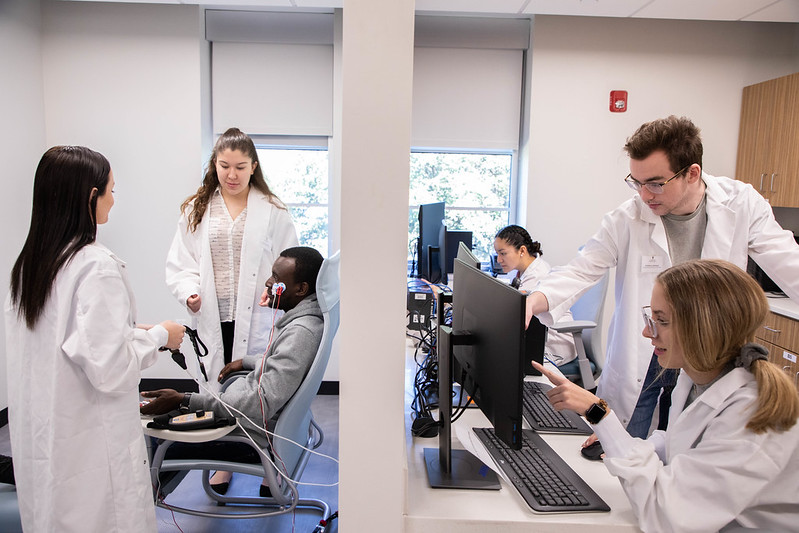
Three centers in the department offer students opportunities to engage in research, community outreach, and self-actualization
The three centers within the Department of Community, Family, and Addiction Sciences (CFAS) serve the community and offer unique opportunities for student enrichment. The Center for Collegiate Recovery Communities (CCRC), Center for Addiction Recovery Research (CARR), and the Center for Family Systems Research and Intervention (CFSRI) powerfully impact the trajectory of CFAS students’ lives during their college careers and beyond.
“The resources available to students in the CCRC are immeasurable,” Texas Tech senior Heather Fraizer said. “I would not have the success in my education that I have had if it were not for the center.”
Frazier appreciated having other students as a resource to help her navigate the daily stressors of higher education when she first joined. She says it was helpful to be surrounded by CCRC faculty members who were themselves certified therapists.
“Most of the staff are professional therapists and that is what I aspire to be,” Frazier said. “I have been fortunate enough to have these models in my daily life who can help me be the best professional in the future.”
During her time at the center, Frazier has participated in the Association of Students About Service (ASAS), a student association affiliated with the CCRC. Through this service organization Frazier has helped harvest apples, volunteered at the Texas Boys Ranch, and thrown fundraisers to serve the local homeless population just to name a few ways she has been able to give back to the community.
The CFSRI houses the Texas Tech Family Therapy Clinic, the Children’s Behavioral Health Clinic at University Medical Center, and the Children’s Advocacy Center of the South Plains, all of which provide mental health services to the greater Lubbock community.
“Through these therapy placements, I was able to connect with people local in the Lubbock community to help heal past traumas, improve family dynamics, and to provide hope in times of stress,” Couple Marriage, and Family Therapy master’s student Raven Garza said.
Garza completed a 150-hour volunteer practicum at the Family Therapy Clinic during her undergraduate education to learn more about Marriage and Family Therapy graduate programs. This experience ultimately led her to pursue a career in academia.
“This program provided me with the support I needed to believe that I am capable and worthy of pursuing a career in academia,” Garza said. “In the program I was able to form long-term relationships with colleagues who have similar research interests as me.”
Clair Babcock, a Biology major, first developed an interest in addiction recovery research after taking the ADRS 2310 course taught by Antover Tuliao. After applying and being accepted to the undergraduate research scholars program, she was tasked with finding a mentor and a specific area of research.
“My first inclination was to do research within the Center for Addiction Recovery Research and present research pertinent to addiction sciences at the Undergraduate Research Conference,” Babcock said.
Babcock joined Tuliao’s lab as a research assistant fall of 2021, where she was able to engage in lab work that aligned with her current studies and career interests. In addition to research pursuits, Babcock was able to volunteer with the medication cleanout at the Texas Tech Health Sciences Center.
“Participation as a research assistant will shape my professional aspirations of attending medical school as my work is centered toward public health and the biophysiological components of addiction,” Babcock said.
Babcock noted that her experience as a research assistant at CARR has been filled with support, encouragement, and knowledge. Her time at the center has enriched her student experience and exposed her to the formalities and execution of research.
“The center offers countless opportunities to become involved, spanning from research assistant positions to participation in studies,” Babcock said. “Regardless of a student’s career aspirations, the center offers plentiful opportunities to expand on a variety of interests and studies.”
